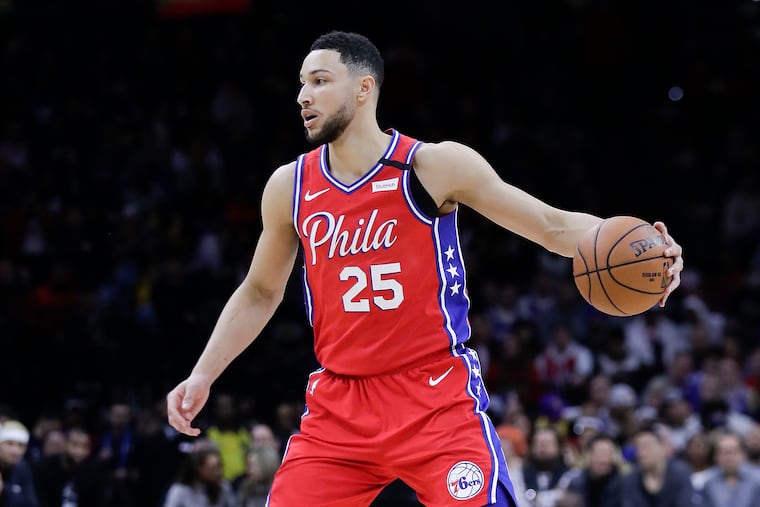Sixers are being vague about Simmons’ lower back injury. But he obviously came back too soon.
Lower-back tightness, stiffness or muscle spasm are the body’s way of guarding itself from further damage.

LOS ANGELES — Was Ben Simmons rushed back too soon?
That’s perhaps the biggest question now that the 76ers’ point guard will miss a considerable amount of time with a pinched nerve in his lower back. The team didn’t provide an expected return date.
The team said the two-time All-Star experienced lower-back tightness while grabbing a rebound during practice on Feb. 19, the first day back from the All-Star break. Simmons received treatment and missed the following day’s game against the Brooklyn Nets.
But the next game for the underachieving Sixers (37-23) was on the road against the NBA’s best team, the Milwaukee Bucks, on Feb. 22, on national television. He plays ... for just 4 minutes, 44 seconds.
When you look at the start of that game, Simmons made a couple of moves to the basket. He scored on a couple of layups. But you could tell his back was tight.
He reaggravated the back injury while driving to the basket and making a hard stop on his way to scoring a layup. You could see that he did something to his back. Simmons came out of the game a couple of series later.
It’s obvious why the third-year veteran wanted to play. The Sixers are getting close to the playoffs. The pressure is on. There’s a lot on the line in regards to playoff series.
In a player’s mind, they’re thinking, ' I’m cool, but I know I’m not 100%. But with treatment through the game, I’m going to be cool.' But if something happens, the player and the organization have to know that the perception and reality will be that they rushed him back.
And that’s the case here, because Simmons obviously was symptomatic. The plan was to provide treatment throughout the game.
From the start of the game, you could see he was stiff. He wasn’t moving normally. That’s the thing with low-back tightness, stiffness, or muscle spasm. Most of it is the body’s way of guarding itself from further damage.
Assuming Simmons has a disc issue or arthritic condition, the muscle that surrounds the joints in his back basically tighten and lock up. It doesn’t want the body to move. The muscle is telling the body it needs time to settle and heal. Rest and inactivity are what gives your back time to heal.
You can do things to break up the tightness and spasms, which the Sixers did pregame. But the tightness and spasms are the body’s mechanism to tell you that’s there’s something underlying.
Now, here we are.
The 6-foot-10, 240-pounder isn’t with the team on its four-game West Coast trip. The Sixers play the Los Angeles Clippers Sunday afternoon at the Staples Center before facing the Lakers Tuesday night, the Sacramento Kings on Thursday, and the Golden State Warriors on Saturday.
Sixers center Joel Embiid (left shoulder sprain) is also not with the team. He could rejoin the Sixers in Northern California. The three-time All-Star suffered his injury this past Wednesday at the Cleveland Cavaliers. The earliest recovery time is 7-10 days. Embiid will be re-evaluated later this week.
The team has been vague in regards to both injuries.
In Simmons’ case, a pinched nerve -- or “nerve impingement” as the Sixers refer to it -- is just a symptom of a larger issue. The team said this past week that Simmons will be re-evaluated in two weeks. It could actually take some time before he’s right.
This isn’t the first time that Simmons has dealt with lower-back issues.
He’s been dealing with lower-back tightness since the 2018-19 season.
Simmons left the team’s Oct. 20, 2018 game against the Orlando Magic with back tightness with 4:19 left in the first quarter. Simmons did not return to the game, and missed the following game. This preseason, he missed the final two games because of it.
It sounds like he may have some chronic degenerative issues, and he’s dealing with the expected symptoms.
That wouldn’t be uncommon for someone of his stature. In regards to the team’s vagueness surrounding Simmons’ injury, one has to assume that it’s being directed by people in his agency. Perhaps they want to publicly minimize the injury to prevent people from saying, down the line, that he has a bad back.
So why not just term it a “nerve impingement” or pinched nerve? Once he gets over that symptom and is back on the court, all will be forgotten, as opposed to saying Simmons has an actual condition.
However, the vagueness of the injury and the timing brings out the skeptics.
Folks are wondering if he actually injured his back at practice while grabbing the rebound. Some are wondering if it happened while on vacation or during a fall in the Feb. 16 All-Star Game.
It’s reminiscent of when it was revealed Embiid had a left knee bone bruise during the 2016-17 season. It was later reported that the MRI that showed the bone bruise also exposed a tear in the meniscus of his knee.
So people are skeptic.
However, Simmons missed only one game with the back tightness.
Yet, there are some metrics for games missed due to particular injuries.
For low-back pain, it’s typically a couple of games. A week to 10 days could be a conservative time to let muscle spasms calm down.
With that said, we all know Simmons would have been better suited not playing against the Bucks.